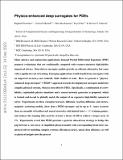| dc.contributor.author | Pestourie, Raphael | |
| dc.contributor.author | Mroueh, Youssef | |
| dc.contributor.author | Rackauckas, Chris | |
| dc.contributor.author | Das, Payel | |
| dc.contributor.author | Johnson, Steven G. | |
| dc.date.accessioned | 2023-12-14T17:48:25Z | |
| dc.date.available | 2023-12-14T17:48:25Z | |
| dc.date.issued | 2023 | |
| dc.identifier.uri | https://hdl.handle.net/1721.1/153164 | |
| dc.description.abstract | Many physics and engineering applications demand Partial Differential Equations (PDE) property evaluations that are traditionally computed with resource-intensive high-fidelity numerical solvers. Data-driven surrogate models provide an efficient alternative but come with a significant cost of training. Emerging applications would benefit from surrogates with an improved accuracy–cost tradeoff, while studied at scale. Here we present a “physicsenhanced deep-surrogate” (“PEDS”) approach towards developing fast surrogate models for complex physical systems, which is described by PDEs. Specifically, a combination of a lowfidelity, explainable physics simulator and a neural network generator is proposed, which is trained end-to-end to globally match the output of an expensive high-fidelity numerical solver. Experiments on three exemplar testcases, diffusion, reaction–diffusion, and electromagnetic scattering models, show that a PEDS surrogate can be up to 3× more accurate than an ensemble of feedforward neural networks with limited data (≈ 10^3 training points), and reduces the training data need by at least a factor of 100 to achieve a target error of 5%. Experiments reveal that PEDS provides a general, data-driven strategy to bridge the gap between a vast array of simplified physical models with corresponding brute-force numerical solvers modeling complex systems, offering accuracy, speed, data efficiency, as well as physical insights into the process. | en_US |
| dc.language.iso | en_US | |
| dc.publisher | Springer Nature | en_US |
| dc.relation.isversionof | https://doi.org/10.1038/s42256-023-00761-y | en_US |
| dc.rights.uri | http://creativecommons.org/licenses/by-nc-sa/4.0/ | en_US |
| dc.source | MIT News Office | en_US |
| dc.title | Physics-enhanced deep surrogates for PDEs | en_US |
| dc.title.alternative | Physics-enhanced deep surrogates for partial differential equations | |
| dc.type | Article | en_US |
| dc.identifier.citation | Pestourie, Raphael, Mroueh, Youssef, Rackauckas, Chris, Das, Payel and Johnson, Steven G. 2023. "Physics-enhanced deep surrogates for PDEs." Nature Machine Intelligence. | |
| dc.contributor.department | Massachusetts Institute of Technology. Department of Mathematics | en_US |
| dc.relation.journal | Nature Machine Intelligence | en_US |
| dc.eprint.version | Author's final manuscript | en_US |
| dc.type.uri | http://purl.org/eprint/type/JournalArticle | en_US |
| eprint.status | http://purl.org/eprint/status/PeerReviewed | en_US |
| dspace.date.submission | 2023-12-14T17:06:21Z | |
| mit.license | OPEN_ACCESS_POLICY | |
| mit.metadata.status | Authority Work and Publication Information Needed | en_US |
